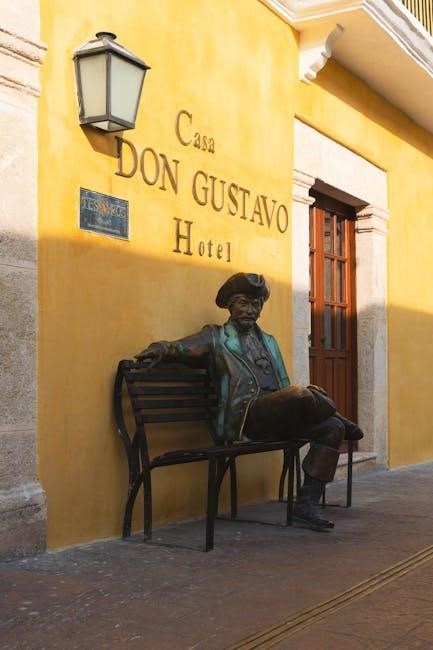A hotel channel guide is a strategic tool enabling properties to manage distribution channels effectively. It helps maximize visibility, revenue, and operational efficiency across various booking platforms.
1.1 Definition and Purpose of a Hotel Channel Guide
A hotel channel guide is a comprehensive tool that lists all distribution channels available for booking. Its primary purpose is to enhance visibility and efficiency, ensuring consistent rates and availability across platforms. By managing these channels effectively, hotels can maximize revenue, streamline operations, and improve customer satisfaction and ensure a seamless guest experience.
1.2 Importance of Channel Guides in the Hospitality Industry
Channel guides are essential for hotels to maximize visibility, efficiency, and revenue. They ensure consistent rates and availability across platforms, preventing overbooking and revenue loss. By optimizing distribution channels, hotels can enhance customer satisfaction, streamline operations, and maintain a competitive edge in the dynamic hospitality industry, ultimately driving long-term success and growth.
Key Distribution Channels for Hotels
Hotels utilize direct bookings, OTAs, GDS, and meta-search engines to enhance reach and efficiency, ensuring seamless customer interactions and optimized revenue streams across diverse platforms.
2.1 Direct Bookings and Official Hotel Websites
Direct bookings via official hotel websites are crucial for maximizing profitability and guest loyalty. They allow hotels to showcase unique offerings, bypass commission fees, and maintain direct customer relationships. Personalized experiences and exclusive deals often incentivize guests to book directly, fostering brand loyalty and higher revenue retention compared to third-party platforms.
2.2 Online Travel Agencies (OTAs)
Online Travel Agencies (OTAs) like Expedia, Booking.com, and Airbnb are powerful platforms for hotels to reach a vast audience. They offer convenience for travelers to compare prices and book accommodations. While OTAs increase visibility, hotels pay commission fees for each booking. Effective OTA management is crucial to balance visibility and profitability, ensuring competitive rates and accurate inventory across platforms.
2.3 Global Distribution Systems (GDS)
Global Distribution Systems (GDS) connect hotels to travel agents, corporations, and travelers worldwide. These platforms enable real-time booking, rate management, and inventory updates. GDS platforms like Sabre, Amadeus, and Galileo are crucial for hotels to reach business travelers and large travel agencies, ensuring broader market exposure. However, hotels must manage associated fees and ensure rate parity across all distribution channels to maximize profitability and efficiency.
2.4 Meta-Search Engines
Meta-search engines like Google Hotel Search, Trivago, and Kayak aggregate hotel listings from multiple sources, allowing users to compare prices and options. These platforms enhance visibility for hotels, driving traffic to their websites or OTAs. They are essential for attracting price-sensitive travelers and maximizing reach, though hotels must optimize their listings and rates to stand out in competitive search results effectively.

Managing Hotel Channel Guide Effectively
Effective management of a hotel channel guide involves using tools like CMS, ensuring rate parity, and optimizing content to maximize bookings and revenue across all distribution channels seamlessly.
3.1 Channel Management Systems (CMS)
A Channel Management System (CMS) is a crucial tool for hotels to efficiently manage their distribution channels. It allows real-time updates of room availability and rates across multiple platforms, including OTAs, GDS, and direct booking systems. By automating inventory and rate adjustments, CMS reduces overbooking risks and ensures consistency. It also integrates with PMS, enhancing operational efficiency and enabling hotels to maximize revenue through optimized distribution strategies.
3.2 Rate Parity and Inventory Management
Rate parity ensures consistent pricing across all distribution channels, preventing undercutting and maintaining customer trust. Effective inventory management balances room availability with demand, optimizing occupancy and revenue. Hotels employ strategies like overbooking and last-minute deals while monitoring channel performance to adjust rates dynamically, ensuring competitive pricing without compromising profitability.
3.3 Content Optimization for Channels
Optimizing content for each channel ensures hotel listings attract target audiences. Tailor descriptions, images, and keywords to match platform-specific demographics; High-quality visuals and detailed amenities enhance appeal, driving engagement and bookings. Regularly updating content based on analytics and guest feedback ensures relevance and competitiveness, improving conversion rates across all distribution channels.

Strategies for Maximizing Revenue Through Channel Guide
Implement dynamic pricing, targeted marketing, and leverage customer feedback to optimize revenue. Analyze channel performance and adjust strategies to maximize bookings and profitability across all platforms.
4.1 Dynamic Pricing and Yield Management
Dynamic pricing adjusts room rates in real-time based on demand, ensuring hotels maximize revenue. Yield management optimizes inventory allocation and pricing to balance occupancy and profitability. Together, they analyze market trends, competitor rates, and guest behavior to set competitive prices, enhancing revenue performance while maintaining guest satisfaction and perceived value.
4.2 Targeted Marketing Across Channels
Targeted marketing involves tailoring campaigns to specific audience segments across distribution channels. Hotels analyze customer data to create personalized offers, improving engagement and conversions. By aligning messaging with channel-specific demographics, hotels enhance brand visibility and appeal, ensuring consistent and relevant communication that drives bookings and loyalty across diverse platforms like OTAs, social media, and direct websites.
4.3 Leveraging Customer Feedback
Leveraging customer feedback is crucial for refining hotel services and enhancing guest experiences. Hotels collect feedback through surveys, reviews, and social media, analyzing it to identify strengths and areas for improvement. By addressing concerns and highlighting positive aspects, hotels can tailor marketing strategies, improve operational efficiency, and build stronger customer relationships, ultimately driving loyalty and repeat bookings.

Challenges in Hotel Channel Management
Managing multiple distribution channels, ensuring rate parity, and adapting to technological advancements are significant challenges hotels face in maintaining effective channel management strategies.
5.1 Overcoming Fragmentation Across Channels
Fragmentation across channels creates complexity in managing bookings, rates, and inventory. Hotels must integrate technology and standardize processes to ensure consistency. Real-time monitoring and automation tools help synchronize data, reducing errors and improving efficiency. By centralizing management, hotels can better allocate resources and deliver a seamless guest experience across all platforms.
5.2 Managing Competing Interests of Different Channels
Each channel has distinct priorities and commission structures, often leading to conflicts. Hotels must balance direct bookings with OTA demands while maintaining rate parity. By setting clear distribution strategies and using channel managers, hotels can align their goals with channel objectives. Regular performance analysis ensures optimal allocation of inventory and rates, fostering harmony among diverse platforms and maximizing revenue potential.
5.3 Adapting to Technological Advancements
Hotels must embrace emerging technologies like AI and machine learning to optimize channel management. Dynamic pricing tools and blockchain integration enhance efficiency and security. Staying updated with tech trends ensures competitiveness and seamless guest experiences, while automation streamlines operations across multiple platforms, fostering innovation and adaptability in a rapidly evolving industry landscape.

Case Studies and Success Stories
Real-world examples highlight hotels that optimized distribution channels, boosting revenue and operational efficiency.Luxury and budget hotels share strategies that drove success and enhanced guest satisfaction.
6.1 Effective Channel Management in Luxury Hotels
Luxury hotels excel by using dynamic pricing and exclusive partnerships with high-end OTAs. They leverage personalized marketing to attract affluent travelers, ensuring rate parity and inventory alignment. A unified CMS streamlines operations, enabling real-time adjustments. These strategies enhance guest experience, driving loyalty and maximizing revenue through targeted, high-yield channels.
6.2 Budget Hotels and Their Channel Strategies
Budget hotels focus on cost-effective distribution strategies, prioritizing direct bookings and partnerships with popular OTAs. They optimize listings with clear, concise content to attract price-sensitive travelers. By maintaining rate consistency and leveraging meta-search engines, budget hotels maximize occupancy without compromising profitability, ensuring a competitive edge in the affordable accommodation market.
Future Trends in Hotel Channel Guide

The future of hotel channel guides lies in seamless integration of emerging technologies and data-driven strategies to enhance guest experiences and optimize revenue streams efficiently.
7.1 Role of Artificial Intelligence (AI)
AI is revolutionizing hotel channel management by optimizing pricing, automating tasks, and enhancing guest experiences. It analyzes data to predict demand, personalize offers, and improve booking processes, ensuring hotels maximize revenue and operational efficiency while delivering tailored services to guests.

7.2 Integration of Blockchain Technology
Blockchain technology enhances security and transparency in hotel channel management. It ensures secure transactions, reduces fraud risks, and streamlines booking processes. By decentralizing data, blockchain improves inventory management and rate parity, fostering trust between hotels and guests while minimizing errors and disputes in real-time.
7.3 Personalization and Guest Experience
Personalization and guest experience are crucial for modern hospitality. Hotels leverage data analytics to tailor services, offering customized packages and preferences; Advanced systems enable real-time feedback, improving service quality. By integrating AI-driven insights, hotels create unique, memorable stays, enhancing loyalty and satisfaction while meeting evolving traveler expectations for personalized and seamless experiences.
Tools and Software for Hotel Channel Management
Effective hotel channel management relies on advanced tools like Channel Management Systems (CMS) and Property Management Systems (PMS). These platforms streamline inventory, rates, and bookings across channels, ensuring efficiency and consistency.
8.1 Popular Channel Management Systems
Popular channel management systems include SiteMinder, Sabre, and Amadeus. These platforms offer real-time updates, synchronized inventory, and automated pricing adjustments across multiple booking channels. They integrate seamlessly with Property Management Systems (PMS) and Customer Relationship Management (CRM) tools, enhancing operational efficiency and revenue optimization for hotels of all sizes.
8.2 CRM and PMS Integration

Integrating CRM (Customer Relationship Management) and PMS (Property Management System) enhances hotel operations by syncing guest data, preferences, and booking details. This integration automates tasks, improves personalized service, and provides actionable insights, enabling hotels to deliver tailored experiences and make data-driven decisions while maintaining seamless communication across all departments.

Leave a Reply
You must be logged in to post a comment.